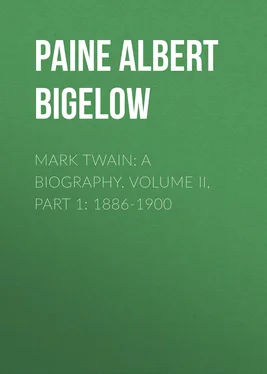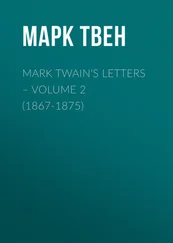Albert Paine - Mark Twain - A Biography. Volume II, Part 1 - 1886-1900
Здесь есть возможность читать онлайн «Albert Paine - Mark Twain - A Biography. Volume II, Part 1 - 1886-1900» — ознакомительный отрывок электронной книги совершенно бесплатно, а после прочтения отрывка купить полную версию. В некоторых случаях можно слушать аудио, скачать через торрент в формате fb2 и присутствует краткое содержание. Жанр: Биографии и Мемуары, foreign_antique, на английском языке. Описание произведения, (предисловие) а так же отзывы посетителей доступны на портале библиотеки ЛибКат.
- Название:Mark Twain: A Biography. Volume II, Part 1: 1886-1900
- Автор:
- Жанр:
- Год:неизвестен
- ISBN:нет данных
- Рейтинг книги:5 / 5. Голосов: 1
-
Избранное:Добавить в избранное
- Отзывы:
-
Ваша оценка:
- 100
- 1
- 2
- 3
- 4
- 5
Mark Twain: A Biography. Volume II, Part 1: 1886-1900: краткое содержание, описание и аннотация
Предлагаем к чтению аннотацию, описание, краткое содержание или предисловие (зависит от того, что написал сам автор книги «Mark Twain: A Biography. Volume II, Part 1: 1886-1900»). Если вы не нашли необходимую информацию о книге — напишите в комментариях, мы постараемся отыскать её.
Mark Twain: A Biography. Volume II, Part 1: 1886-1900 — читать онлайн ознакомительный отрывок
Ниже представлен текст книги, разбитый по страницам. Система сохранения места последней прочитанной страницы, позволяет с удобством читать онлайн бесплатно книгу «Mark Twain: A Biography. Volume II, Part 1: 1886-1900», без необходимости каждый раз заново искать на чём Вы остановились. Поставьте закладку, и сможете в любой момент перейти на страницу, на которой закончили чтение.
Интервал:
Закладка:
When Mark Twain had an impulse like that it was possible for it to result in something dangerous, especially in those earlier days. This time it produced a bombshell; not just an ordinary bombshell, or even a twelve-inch projectile, but a shell of planetary size. It was a sort of hoax-always a doubtful plaything—and in this case it brought even quicker and more terrible retribution than usual. It was an imaginary presentation of three disreputable frontier tramps who at some time had imposed themselves on a lonely miner as Longfellow, Emerson, and Holmes, quoting apposite selections from their verses to the accompaniment of cards and drink, and altogether conducting themselves in a most unsavory fashion. At the end came the enlightenment that these were not what they pretended to be, but only impostors—disgusting frauds. A feature like that would be a doubtful thing to try in any cultured atmosphere. The thought of associating, ever so remotely, those three old bummers which he had conjured up with the venerable and venerated Emerson, Longfellow, and Holmes, the Olympian trinity, seems ghastly enough to-day, and must have seemed even more so then. But Clemens, dazzled by the rainbow splendor of his conception, saw in it only a rare colossal humor, which would fairly lift and bear his hearers along on a tide of mirth. He did not show his effort to any one beforehand. He wanted its full beauty to burst upon the entire company as a surprise.
It did that. Howells was toastmaster, and when he came to present Clemens he took particular pains to introduce him as one of his foremost contributors and dearest friends. Here, he said, was "a humorist who never left you hanging you head for having enjoyed his joke."
Thirty years later Clemens himself wrote of his impressions as he rose to deliver his speech.
I vaguely remember some of the details of that gathering: dimly I can see a hundred people—no, perhaps fifty—shadowy figures, sitting at tables feeding, ghosts now to me, and nameless forevermore. I don't know who they were, but I can very distinctly see, seated at the grand table and facing the rest of us, Mr. Emerson, supernaturally grave, unsmiling; Mr. Whittier, grave, lovely, his beautiful spirit shining out of his face; Mr. Longfellow, with his silken-white hair and his benignant face; Dr. Oliver Wendell Holmes, flashing smiles and affection and all good- fellowship everywhere, like a rose-diamond whose facets are being turned toward the light, first one way and then another—a charming man, and always fascinating, whether he was talking or whether he was sitting still (what he would call still, but what would be more or less motion to other people). I can see those figures with entire distinctiness across this abyss of time.
William Winter, the poet, had just preceded him, and it seemed a moment aptly chosen for his so-different theme. "And then," to quote Howells, "the amazing mistake, the bewildering blunder, the cruel catastrophe was upon us."
After the first two or three hundred words, when the general plan and purpose of the burlesque had developed, when the names of Longfellow, Emerson, and Holmes began to be flung about by those bleary outcasts, and their verses given that sorry association, those Atlantic diners became petrified with amazement and horror. Too late, then, the speaker realized his mistake. He could not stop, he must go on to the ghastly end. And somehow he did it, while "there fell a silence weighing many tons to the square inch, which deepened from moment to moment, and was broken only by the hysterical and blood-curdling laughter of a single guest, whose name shall not be handed down to infamy."
Howells can remember little more than that, but Clemens recalls that one speaker made an effort to follow him—Bishop, the novelist, and that Bishop didn't last long.
It was not many sentences after his first before he began to hesitate and break, and lose his grip, and totter and wobble, and at last he slumped down in a limp and mushy pile.
The next man had not strength to rise, and somehow the company broke up.
Howells's next recollection is of being in a room of the hotel, and of hearing Charles Dudley Warner saying in the gloom:
"Well, Mark, you're a funny fellow."
He remembers how, after a sleepless night, Clemens went out to buy some bric-a-brac, with a soul far from bric-a-brac, and returned to Hartford in a writhing agony of spirit. He believed that he was ruined forever, so far as his Boston associations were concerned; and when he confessed all the tragedy to Mrs. Clemens it seemed to her also that the mistake could never be wholly repaired. The fact that certain papers quoted the speech and spoke well of it, and certain readers who had not listened to it thought it enormously funny, gave very little comfort. But perhaps his chief concern was the ruin which he believed he had brought upon Howells. He put his heart into a brief letter:
MY DEAR HOWELLS,—My sense of disgrace does not abate. It grows. I see that it is going to add itself to my list of permanencies, a list of humiliations that extends back to when I was seven years old, and which keep on persecuting me regardless of my repentances.
I feel that my misfortune has injured me all over the country; therefore it will be best that I retire from before the public at present. It will hurt the Atlantic for me to appear in its pages now. So it is my opinion, and my wife's, that the telephone story had better be suppressed. Will you return those proofs or revises to me, so that I can use the same on some future occasion?
It seems as if I must have been insane when I wrote that speech and saw no harm in it, no disrespect toward those men whom I reverenced so much. And what shame I brought upon you, after what you said in introducing me! It burns me like fire to think of it.
The whole matter is a dreadful subject. Let me drop it here—at least on paper.
Penitently yours, MARKSo, all in a moment, his world had come to an end—as it seemed. But Howells's letter, which came rushing back by first mail, brought hope.
"It was a fatality," Howells said. "One of those sorrows into which a man walks with his eyes wide open, no one knows why."
Howells assured him that Longfellow, Emerson, and Holmes would so consider it, beyond doubt; that Charles Eliot Norton had already expressed himself exactly in the right spirit concerning it. Howells declared that there was no intention of dropping Mark Twain's work from the Atlantic.
You are not going to be floored by it; there is more justice than that even in this world. Especially as regards me, just call the sore spot well. I can say more, and with better heart, in praise of your good feeling (which was what I always liked in you), since this thing happened than I could before.
It was agreed that he should at once write a letter to Longfellow, Emerson, and Holmes, and he did write, laying his heart bare to them. Longfellow and Holmes answered in a fine spirit of kindliness, and Miss Emerson wrote for her father in the same tone. Emerson had not been offended, for he had not heard the speech, having arrived even then at that stage of semi-oblivion as to immediate things which eventually so completely shut him away. Longfellow's letter made light of the whole matter. The newspapers, he said, had caused all the mischief.
A bit of humor at a dinner-table talk is one thing; a report of it in the morning papers is another. One needs the lamplight and the scenery. These failing, what was meant in jest assumes a serious aspect.
I do not believe that anybody was much hurt. Certainly I was not, and Holmes tells me that he was not. So I think you may dismiss the matter from your mind, without further remorse.
It was a very pleasant dinner, and I think Whittier enjoyed it very much.
Holmes likewise referred to it as a trifle.
Читать дальшеИнтервал:
Закладка:
Похожие книги на «Mark Twain: A Biography. Volume II, Part 1: 1886-1900»
Представляем Вашему вниманию похожие книги на «Mark Twain: A Biography. Volume II, Part 1: 1886-1900» списком для выбора. Мы отобрали схожую по названию и смыслу литературу в надежде предоставить читателям больше вариантов отыскать новые, интересные, ещё непрочитанные произведения.
Обсуждение, отзывы о книге «Mark Twain: A Biography. Volume II, Part 1: 1886-1900» и просто собственные мнения читателей. Оставьте ваши комментарии, напишите, что Вы думаете о произведении, его смысле или главных героях. Укажите что конкретно понравилось, а что нет, и почему Вы так считаете.












